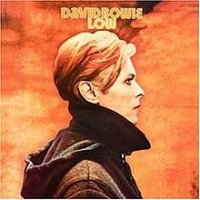David Bowie is one of the greatest musicians of all time. Knock him all you want--he made plenty of crappy albums, he stole from a lot of people--but he's still awesome, and you're still a dick. Dude wrote "Queen Bitch;" what have you done? At the same time, Bowie's discography is admittedly not perfect. "Queen Bitch," for example, comes from Hunky Dory, an album that boasts some pretty amazing songs ("Changes," "Life on Mars?", "Oh! You Pretty Things") and some pretty crappy ones ("Andy Warhol," "Fill Your Heart"). Most of his albums are worth owning; few are perfect.
There are still quite a few records in his vast discography that stand out as exceptional, though, and most of them were released in the '70s. The Rise and Fall of Ziggy Stardust and the Spiders From Mars is, for many, the zenith of Bowie's glam rock period, while Low is the pinnacle of his experiment/post-punk period and the best entry in his "Berlin Trilogy" for others. They were released five years apart, and they sound like they came from two very different creators. You can argue that Ziggy and Low weren't entirely left field creations--flecks of glam rock show up The Man Who Sold the World, while Station to Station predicts the krautrock direction Bowie would fleetingly embrace--but both are the best starting points for exploring those respective points in the man's career.
I'm a Bowie dork, so I think everything he did from 1969 (Space Oddity) to '86 (um⦠the Labyrinth soundtrack) is worth owning, and I alternate my favorites constantly. Still, the one I put on most frequently is Low. For his first collaboration with Brian Eno, Bowie piled on the synthesizers, although new best buddy Carlos Alomar certainly drops in some guitar, as does Ricky Gardiner. The instrument that stands out the most for me, though, is the drums. Producer Tony Visconti pulled some magic tricks to create a punchy, cavernous sound that has never been duplicated. I go back and forth over who got better drum sounds, Steve Albini on Nirvana's In Utero or Visconti on Low. Ziggy might rock more, but the drums on "Breaking Glass" hit so much harder.
Low is a dynamic record, one that lends itself to different moods. There's a chilly mood that lingers, but plenty of guitar licks that give it a sunnier vibe, like on the opening instrumental "Speed of Life." Other standouts include the spastic rhythm of "What in the World" and the ominous build of "Always Crashing in the Same Car." These opening tunes are all condensed, poppy, yet otherworldly. The flipside explores more ethereal territory, like the lengthy "Warszawa." "Art Decade" is another solid, searching tune. "Weeping Wall" is deliciously weird.
Ziggy is the better gateway album to Bowie's world, but Low is the better album overall (Better album cover tooâ¦way less mullet). It was more ahead of its time, then and now. Plenty of today's indie bands can be connected back to Low; few have equaled its excellence. In a way, it also marks the slow, slow decline of Bowie. Not that he didn't keep making good records ("Heroes", The Lodger and, again, the Labyrinth soundtrack all come to mind), but it's the last perfect Bowie record.
Seriously, though, listen to those drums!
